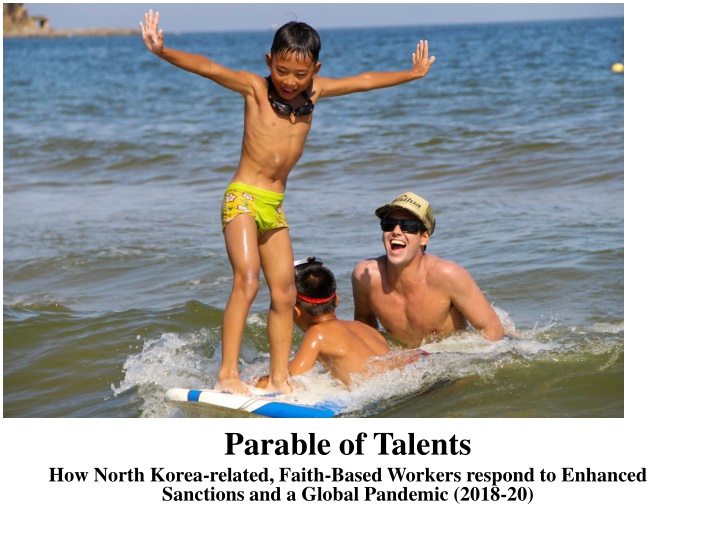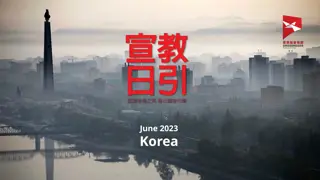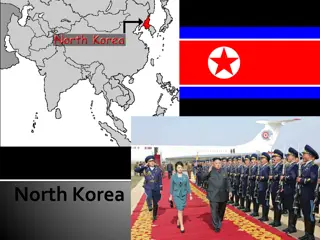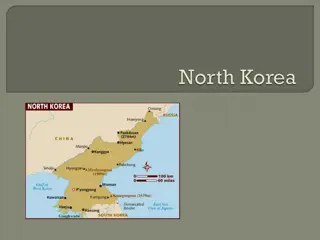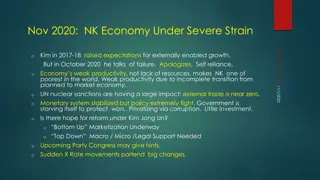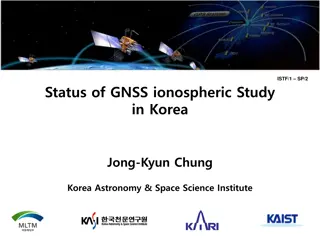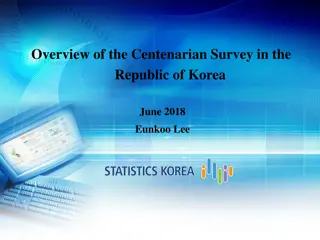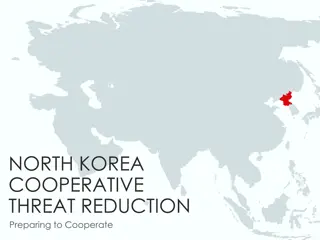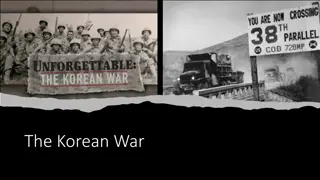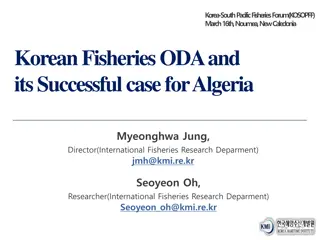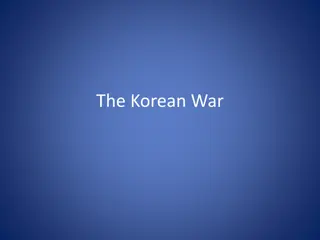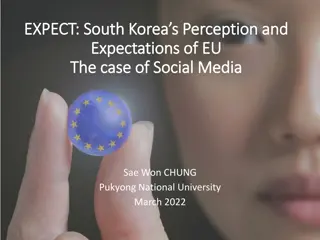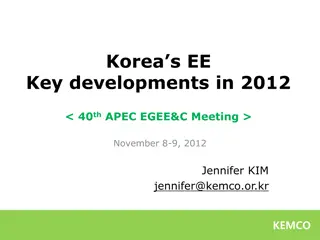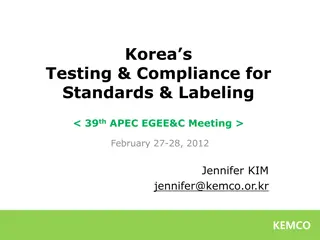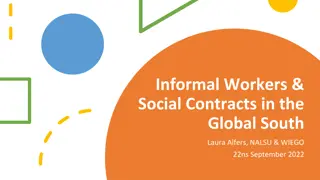Faith-Based Workers' Responses to Restrictions in North Korea Amid Global Challenges (2018-20)
Faith-based workers of North Korea-related organizations faced challenges due to governmental restrictions, enhanced sanctions (2017-18), and a global pandemic (2020). This study explores how American members of faith-based organizations responded to these obstacles, highlighting distinct narratives for external and internal audiences. The findings show how humanitarian evangelicals and human-rights evangelicals approached their mission differently, focusing on human rights, humanitarian aid, and the role of North Korean migrants in their work.
Uploaded on Sep 25, 2024 | 1 Views
Download Presentation

Please find below an Image/Link to download the presentation.
The content on the website is provided AS IS for your information and personal use only. It may not be sold, licensed, or shared on other websites without obtaining consent from the author.If you encounter any issues during the download, it is possible that the publisher has removed the file from their server.
You are allowed to download the files provided on this website for personal or commercial use, subject to the condition that they are used lawfully. All files are the property of their respective owners.
The content on the website is provided AS IS for your information and personal use only. It may not be sold, licensed, or shared on other websites without obtaining consent from the author.
E N D
Presentation Transcript
Parable of Talents How North Korea-related, Faith-Based Workers respond to Enhanced Sanctions and a Global Pandemic (2018-20)
GRRI Researchers Joseph Yi Political Science, Hanyang University, joyichicago@yahoo.com https://hanyang.academia.edu/JosephYi Bill Hayes Sociology, Gonzaga University, hayesw@gonzaga.edu
QUESTION How do faith-based workers respond to severe, governmental restrictions on their operations? How did American members of NK-oriented, faith-based organizations (FBOs) "US humanitarian evangelicals respond to restrictions linked to 2017-18 enhanced sanctions and a 2020-21 global pandemic? Method and Data Three-year (2018-2020) study of US humanitarian evangelicals, based in South Korea and US. Eight US citizens, one Canadian (Jamie Kim). Non-confidential interviews with Gabe Segoine (LNKM/Surfing the Nations), Ben Torrey (Three Seas Center), and Chon Yu-taik (PUST); publicly available content from Joy and Stephen Yoon (Ignis Community) and Jamie Kim (Reah International); and confidential communications from three, anonymous workers (Hobbes*; Pablo and Diana Mata*).
Governmental restrictions 2017-18 Enhanced Sanctions Geographical Travel Restriction allows Americans travel to DPRK only in extremely limited circumstances (1 Sept. 2017). UN Security Council Resolution 2397 (22 Dec. 2017) prohibits export of machinery, transportation vehicles, and metals to DPRK. US s North Korea Sanctions Regulations (amended 5 March 2018) prohibits US NGOs from partnering with any branch of DPRK government without specific license from Treasury Department s Office of Foreign Assets Control. 2020- Pandemic-related Border Closures (China, DPRK)
FINDINGS FBO workers articulate distinct narratives for external and internal audiences. External: US Public; Mainstream & Christian Media Human-rights vs. Humanitarian evangelicals Human-rights evangelicals valorize defector-activists as victims (of NK regime) and as vanguards (of future reunification). North Korean migrants become subjectified as the chosen ones in the Christian community. In the same spirit, they also learn to become victim-survivors of the socialist dictatorship and to use the rhetoric of the human-rights discourse against the North They are considered to be doing God s calling, with the expectation that they will return to their homeland as God s warriors to enlighten their families .[Right- wing] evangelical churches believe that there are none more qualified than North Korean migrants in realizing God s great plan for national evangelization. (Jung, J.H. 2016. The Religious-Political Aspirations of North Korean Migrants and Protestant Churches in Seoul. Journal of Korean Religions, 7(2), 123-148)
(External Audience) Humanitarian evangelicals narrate North Korean children and students as victims (of sanctions) and vanguards (of future unification). Ein, a ten year-old girl that came to us, was unable to sit-up or walk. She was quadriplegic and had to be strapped to a chair just to listen in on class lessons. But, after about 11 months of intense therapy, she was able to walk out of the hospital without any assistance. This young lady is now attending regular school and hopes to become a doctor so that she can treat other children like herself someday. (Ignis Community, https://igniscommunity.org/pysrc) [PUST students] are the most hardworking. They stay up all night and then complete the homework. (PUST President Chon Yu-taik, 2019 )
(External Audience) Sanctions are intended to pressure the government towards denuclearization, but what we are discovering is that instead of hurting the elite, sanctions are preventing humanitarian aid from entering the country and are causing deaths, particularly among women and children. It is estimated that in the year of 2018, approximately up to 4,000 North Koreans could have died as a result of sanctions. Yoon, J.E. 2019, The Human Costs of Sanctions on North Korea. https://www.joyellenyoon.com/blog/2019/11/2/the- human-costs-of-sanctions-on-north-korea
Internal audience: NK-oriented humanitarian evangelicals. Discouraged evangelicals interpret sanctions and pandemic as God s closing the doors on North Korea. Their projects have lost their momentum As the travel ban extends each time, more members are wondering if they could wait further or they should go to another field. (Hobbes, 5 July 2020) I can t help but to think about Moses as he was not allowed to enter into the Promised Land. Deuteronomy 32:52 Therefore, you will see the land only from a distance; you will not enter the land I am giving to the people of Israel. For the next 40 years Moses is stuck wandering in a wilderness and ultimately never entering the Promised Land. Many times I have felt NE Asia to be a Promised Land, yet we are currently not allowed to be there, a place where our hearts long to be. (Pablo, 12 April 2018)
(Internal Audience) More-committed evangelicals frame this period as parable of talents moment to prepare for God s special plan for Korea. Many of us here in Taebaek are here due to the closing of doors in other places. We may be tempted to feel that we are frozen in a waiting period. But just like in the parable of the talents, even though we are waiting for our Master to return or for doors to re-open, we are not to be stagnantly waiting. We are called to invest our talents as we actively wait for opportunities to arise, doubling, tripling, or even quadrupling that which has been given us .Whether that be in language acquisition, cultural understanding, or professional development, today is a precious gift as we look forward to witnessing how our Father will work in the midst of all these circumstances to glorify His Name on the Peninsula. (Yoons newsletter, 25 July 2020)
Theoretical Implications Politicization of Humanitarian Organizations 2017-18 sanctions accelerated collective orientation shift from emergency relief to alchemic discourse (addressing structural roots of suffering), and heightened sensitivity to reliance on US government policies; and these shifts fueled political advocacy. Barnett, M. (2009). Evolution without progress? Humanitarianism in a world of hurt. Dual Evangelical approaches to outgroups: symbolic boundaries & interpersonal relationships - symbolic boundaries that create distinction between themselves and relevant outgroups (Smith, 1998, p. 96) - the only truly effective way to change the world is one-individual-at-a-time through the influence of interpersonal relationships (Smith, 1998, p. 187). Smith, C. (1998). American Evangelicalism: Embattled and Thriving. Chicago, IL: University of Chicago Press.
(Theoretical Implications) Religious Approaches to Dissonance Dissonance between NK-oriented, evangelical ideals (e.g., God s special plan for Korea) and empirical realities (sustained sanctions and border closures). Adaptive strategies (Dawson, 1999, p. 63) include rationalizing the current period as a test of faith ; reaffirming their commitment to the NK-humanitarian mission; and proselytizing this mission to other Christians. Dawson, L.L. (1999). When prophecy fails and faith persists.
US POLICY IMPLICATIONS As Biden Administration reviews policy options, it would benefit from credible, first-hand information about what is actually happening inside the DPRK. FBOs are among most active contributors to peaceful development of North Korea. They have witnessed tremendous changes in the past two decades and hope for more in upcoming decades. They wish to share their experiences with their fellow Americans and assist the US government to exercise prudent judgment with regards to North Korea.
